A letter from Karla Koll serving in Costa Rica
May 2015 - Annual Ministry Update, 2014
Dear Companions in Mission,
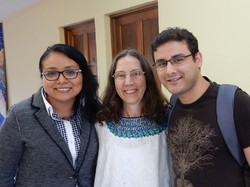
Karla (center) with students Priscila Barredo (Mexico) and Luis Alvarez (Costa Rica)
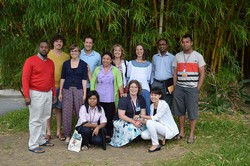
Karla with GIT students
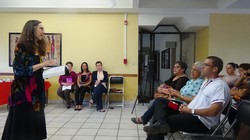
Karla preaching at UBL graduation
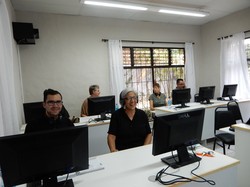
UBL trying out the new computer lab
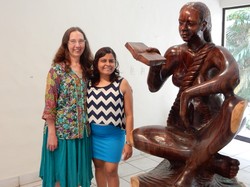
Karla with graduate Blanca Aida Rivas Rodas
Teaching and learning are at the heart of a university. Over the past year I have taught courses on mission and on the history of Christianity around the world to students here in Costa Rica as well as distance students in Honduras, Peru, Ecuador, Curacao and the United States. Students often think the Christian communities of the past have nothing to teach us that can help us follow Christ today. One student from Honduras wrote recently, “I never imagined that studying history could be anything other than boring. Thank you for opening my eyes.” As students learn how churches in the past reached theological conclusions in particular contexts, they realize they are not bound to repeat the theologies of the past. They have the freedom to develop theologies that respond to their own contexts.
While my students learn about the history of the church, I also help them learn how to express themselves in writing. The students of the Latin American Biblical University (UBL) come from sectors of society where economic resources are scarce. In most cases their secondary education is quite deficient. Carlos, a student in Honduras, worked as a child on the street selling the candy his mother made. He, like many of our students, wasn’t able to attend school as a child. He received his high school education in an accelerated program for adults. Carlos always apologizes profusely for his spelling and grammar mistakes. I tell him he has no reason to apologize for the fact that no one ever taught him how to write well. It makes me sad and angry to think that governments and educational systems haven’t seen these students as persons with important ideas to contribute. Here at the UBL we believe in our students. We are committed to helping them learn to express their ideas and take part in theological conversations in Latin America and beyond. Danitz Chirinos is a Peruvian student who is learning to find her own voice as she writes her bachelor’s thesis under my guidance on children as active participants in God’s mission through the local church.
Service on the faculty of any university involves a certain amount of administrative work. At the beginning of 2015 my colleagues asked me to be the chair of the School of Theological Sciences. The best part of this new job is reaching out to our students throughout Latin America. When the Costa Rican courts decided at the beginning of 2012 that the UBL can no longer have branches operating outside of national territory, many of our students didn’t know if they would be able to finish their degrees. Over and over again they say to me, “Thank you for not forgetting us.” Many are now taking distance courses and others are starting work on their theses. Tomas is a Methodist pastor in Bolivia who has just taken a new pastorate in La Paz where the members of the congregation are indigenous folks who are now living in the city. In his thesis he wants to explore the relationship between the Eucharist and communal celebrations in the Aymara culture. Sarvia from Peru is working on the theological framework of an interreligious women’s organization that is working for peace. In Colombia, Andres wants to offer a theological interpretation of the peace process that may finally bring an end to decades of civil war in his country. I also receive messages from people who want to start their theological studies. Alexandra, a nun from Colombia who is working in Haiti, wrote to say how much she wants to study theology so she can be more effective in her pastoral work. In order to continue to respond to the desire of people to study theology with a liberating perspective, we are working hard to meet government requirements for putting our programs online.
Connections with the broader Reformed family of churches have brought new dimensions to my mission service during the past year. The Global Institute of Theology (GIT), a program of the World Communion of Reformed Churches (WCRC), brought theology students and professors from 16 countries together on our campus in Costa Rica for three weeks in July of 2014 for classes focused on the theme “Transforming Mission, Church and Community.” I served as the local coordinator for the GIT and I also taught a course on Christian mission in Latin America. Then in November I traveled to Hungary to participate in the first meeting of the current round of the Pentecostal-Reformed dialogue. We are sharing about how mission is understood and practiced in our two traditions in the hope of learning how we can be more faithful to Jesus Christ today.
Over the past year I have had several opportunities to share God’s Word. I have preached in Presbyterian and Pentecostal churches as well as for the Emmaus Community, an interdenominational church that meets on our campus. I have also served as the preacher on several occasions for our weekly worship services at the UBL. At the graduation service held on April 22 the text was Luke 24:36-44, one of the post-resurrection appearances. Jesus “opens the minds” of his gathered followers to help them interpret the Scriptures anew to find hope to go forward. Wherever the resurrected Christ is present, minds are opened. Here at the UBL we work to open minds. Our graduates are at work in many places, offering renewed interpretations of Scripture and theology to bring hope to their communities.
Blanca Aida Rivas Rodas, a young Presbyterian woman from Honduras, was one of the students recognized at our graduation service. Her thesis for her licentiate in theology offered an interpretation of God from the perspective of someone with a physical disability. She stood with tears streaming down her face as she thanked the UBL faculty: “You always believed in me, even when others said I won’t be able to do this.” When my students see me, they know that I am here with the support of many sisters and brothers in the United States who believe in them and their ability to be agents of transformation in their churches and communities. Thank you for believing in our students. Thank you for your gifts and prayers that make my service here at the Latin American Biblical University possible. I hope that my students and I can count on your ongoing support.
Karla
The 2015 Presbyterian Mission Yearbook for Prayer & Study, p. 66, 67
Read more about Karla Ann Koll's ministry
Write to Karla Ann Koll
Individuals: Give online to E200373 for Karla Ann Koll's sending and support
Congregations: Give to D506645 for Karla Ann Koll's sending and support
Churches are asked to send donations through your congregation’s normal receiving site (this is usually your presbytery).

